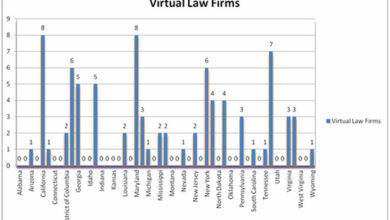Insights into the Career of a Bankruptcy Lawyer
Bankruptcy law is a specialized field that deals with the legal proceedings related to individuals or businesses who are unable to repay their debts. A bankruptcy lawyer is a legal professional who specializes in guiding clients through the complex bankruptcy process, offering legal advice, and representing them in court. In this article, we will delve into the career of a bankruptcy lawyer, exploring the education and skills required, the job responsibilities, and the potential benefits and challenges of this profession.
Education and Skills Required
Like other legal professions, becoming a bankruptcy lawyer requires a solid educational foundation. Individuals interested in pursuing a career in this field must obtain a bachelor’s degree, followed by a Juris Doctor (JD) degree from an accredited law school. Admission to law school typically requires a high undergraduate GPA, a competitive score on the Law School Admission Test (LSAT), and strong letters of recommendation.
Once law school is completed, aspiring bankruptcy lawyers must pass the bar exam in the state where they wish to practice. The bar exam is a rigorous test that assesses the candidate’s knowledge of general legal principles and their ability to apply them in various scenarios. Passing the bar exam is a crucial step towards becoming a licensed attorney.
While a law degree provides the foundational knowledge required for a bankruptcy lawyer, additional skills are essential for success in this career. Bankruptcy lawyers need to have excellent analytical skills to analyze complex financial situations and identify the best legal strategies for their clients. Strong research and writing skills are also vital as bankruptcy cases often involve extensive documentation and legal briefs.
Furthermore, bankruptcy lawyers must possess outstanding communication and negotiation skills. They need to effectively communicate with their clients, explaining the bankruptcy process, legal options, and potential outcomes. They also need to negotiate with creditors and other parties involved in the bankruptcy proceedings to reach favorable settlements for their clients.
Job Responsibilities
Bankruptcy lawyers have diverse responsibilities that encompass both legal and advisory roles. Let’s explore some of the key job responsibilities of a bankruptcy lawyer:
- Client Consultation: Bankruptcy lawyers meet with clients to assess their financial situation, understand their goals, and determine the best course of action. They provide guidance on the different types of bankruptcy, such as Chapter 7 or Chapter 13, and explain the eligibility criteria and potential consequences.
- Case Evaluation: After gathering all the relevant information, bankruptcy lawyers evaluate the viability of a bankruptcy case. They analyze the client’s debts, assets, income, and financial history to determine the best approach to resolving the debt crisis.
- Legal Documentation: Bankruptcy proceedings involve extensive paperwork and documentation. Bankruptcy lawyers assist clients in preparing and filing the necessary legal documents, such as bankruptcy petitions, schedules, and statements of financial affairs.
- Representation: Bankruptcy lawyers represent their clients in court proceedings, such as bankruptcy hearings and meetings of creditors. They present the client’s case, argue on their behalf, and negotiate with opposing counsel to protect the client’s interests.
- Negotiation: Bankruptcy lawyers negotiate with creditors to reach settlements and debt repayment plans that are favorable for their clients. They aim to reduce the overall debt burden and secure more manageable repayment terms.
- Advisory Role: In addition to legal representation, bankruptcy lawyers serve as advisors to their clients. They provide guidance on financial management, credit counseling, and strategies for rebuilding credit after bankruptcy.
Benefits and Challenges of a Bankruptcy Lawyer
Being a bankruptcy lawyer offers several benefits, but it also comes with its fair share of challenges. Let’s explore both sides of the coin:
Benefits:
- Opportunity to Make a Difference: Bankruptcy lawyers have the opportunity to make a significant impact on their clients’ lives by helping them navigate through financial hardships and providing them with a fresh start.
- Varied Work: Bankruptcy law involves a wide range of legal issues, including contract law, tax law, and property law. This diversity keeps the work interesting and allows bankruptcy lawyers to develop a broad skill set.
- High Demand: With economic fluctuations and financial uncertainties, the demand for bankruptcy lawyers remains relatively high. This ensures a steady stream of clients and job opportunities in the field.
- Competitive Salary: Bankruptcy lawyers often earn competitive salaries, especially as they gain experience and establish a reputable practice. The potential for high earnings is an attractive aspect of this career.
- Personal and Professional Growth: Bankruptcy law is a challenging field that constantly evolves. Lawyers in this profession have ample opportunities for personal and professional growth, whether it be through continuing education, specialization, or professional networking.
Challenges:
- Emotional Toll: Dealing with clients who are going through financial distress can be emotionally draining. Bankruptcy lawyers must have the resilience to handle the stress associated with clients’ emotional turmoil.
- Long Hours: Bankruptcy cases can be complex and time-consuming. Lawyers often work long hours, especially when preparing legal documents, conducting research, or representing clients in court.
- High-Stakes Environment: The outcome of bankruptcy cases can have a significant impact on the financial future of clients. Bankruptcy lawyers must handle high-stakes situations and make critical decisions that directly affect their clients’ lives.
- Constant Learning: Bankruptcy laws and regulations are subject to frequent changes. Bankruptcy lawyers must stay updated with the latest legal developments, attend continuing education programs, and adapt to new legal precedents.
- Client Expectations: Clients often have high expectations regarding the outcome of their bankruptcy cases. Bankruptcy lawyers must manage these expectations effectively and provide realistic advice to their clients.
Case Studies and Statistics
Examining case studies and statistics can provide valuable insights into the impact of bankruptcy lawyers on individuals and businesses. Let’s explore a few examples:
Case Study 1: Personal Bankruptcy
In a personal bankruptcy case, John Smith was drowning in debt, unable to repay his obligations due to a sudden job loss. He sought the assistance of a bankruptcy lawyer who guided him through the Chapter 7 bankruptcy process. The lawyer helped John discharge his unsecured debts, including credit card bills and medical expenses, providing him with a fresh financial start. With the lawyer’s expertise, John was able to protect his assets, such as his home and car, and rebuild his credit over time.
Case Study 2: Business Bankruptcy
In a business bankruptcy case, XYZ Corporation faced mounting debts and declining revenue. The company’s management decided to file for Chapter 11 bankruptcy, aiming to restructure and continue operations. A bankruptcy lawyer was hired to navigate the complex legal requirements and negotiate with creditors. The lawyer successfully secured a debt restructuring plan, allowing XYZ Corporation to reduce its debt burden and regain financial stability. With the lawyer’s assistance, the company implemented cost-cutting measures, renegotiated contracts, and emerged from bankruptcy as a stronger and more viable entity.
Statistics also shed light on the prevalence and impact of bankruptcy cases:
- The Administrative Office of the U.S. Courts reported that there were approximately 752,160 bankruptcy filings in the United States in 2020.
- In the same year, Chapter 7 bankruptcy, which involves liquidation of assets, accounted for 64% of all bankruptcy filings, while Chapter 13 bankruptcy, which involves debt repayment plans, accounted for 35%.
- According to the American Bankruptcy Institute, the majority of personal bankruptcy filings are due to medical expenses, job loss, and unexpected financial crises.
- Business bankruptcies often result from factors such as excessive debt, economic downturns, or mismanagement.
Conclusion
Bankruptcy law is a specialized and rewarding field that offers lawyers the opportunity to help individuals and businesses overcome financial hardships. With a solid educational foundation, strong analytical and communication skills, and the ability to navigate complex legal processes, bankruptcy lawyers play a crucial role in guiding clients through the bankruptcy process, protecting their interests, and providing them with a fresh start. While this profession comes with its challenges, the benefits, including the ability to make a difference and the potential for personal and professional growth, make it an attractive career choice.
FAQs (Frequently Asked Questions)
Q1: How long does it take to become a bankruptcy lawyer?
A1: The path to becoming a bankruptcy lawyer typically involves obtaining a bachelor’s degree, completing law school, passing the bar exam, and gaining relevant experience. This process can take approximately seven to eight years.
Q2: What is the average salary of a bankruptcy lawyer?
A2: The average salary of a bankruptcy lawyer varies based on factors such as experience, location, and the size of the law firm. According to the Bureau of Labor Statistics, the median annual wage for lawyers was $126,930 in May 2020. However, it’s important to note that this figure encompasses all types of lawyers and may not specifically reflect the salary of a bankruptcy lawyer.
Q3: Is there a high demand for bankruptcy lawyers?
A3: Yes, there is a consistent demand for bankruptcy lawyers, especially during times of economic instability. Economic downturns and financial crises often lead to an increase in bankruptcy filings, creating a need for legal professionals who specialize in this area. Additionally, as individuals and businesses seek to navigate complex bankruptcy laws and protect their interests, the expertise of bankruptcy lawyers becomes invaluable.
Q4: Can bankruptcy lawyers work in both personal and business bankruptcy cases?
A4: Yes, bankruptcy lawyers can work in both personal and business bankruptcy cases. Personal bankruptcy cases involve individuals who are unable to repay their debts and seek relief under Chapter 7 or Chapter 13 bankruptcy. Business bankruptcy cases, on the other hand, involve financially distressed companies that may file for Chapter 7, Chapter 11, or Chapter 13 bankruptcy depending on their circumstances. Bankruptcy lawyers can specialize in either personal or business bankruptcy, or handle both types of cases depending on their practice area and expertise.
Q5: How do bankruptcy lawyers help clients rebuild their credit after bankruptcy?
A5: Bankruptcy lawyers can provide guidance to their clients on rebuilding their credit after bankruptcy. They may advise clients on strategies such as creating a budget, managing expenses, and establishing a positive credit history. Additionally, bankruptcy lawyers can offer recommendations for credit counseling services or resources that can assist clients in improving their financial situation. Over time, with responsible financial management, individuals can rebuild their credit scores and regain their financial footing.
Summary
The career of a bankruptcy lawyer involves guiding individuals and businesses through the complex bankruptcy process, offering legal advice, and representing clients in court. To become a bankruptcy lawyer, one must obtain a bachelor’s degree, a Juris Doctor (JD) degree, and pass the bar exam. In addition to legal knowledge, bankruptcy lawyers require skills such as analysis, research, negotiation, and communication.
Bankruptcy lawyers have diverse responsibilities, including client consultations, case evaluations, legal documentation, representation in court, negotiation with creditors, and advisory roles. They have the opportunity to make a difference in their clients’ lives and benefit from a competitive salary and personal and professional growth. However, they also face challenges such as emotional toll, long hours, high-stakes environments, constant learning, and managing client expectations.
Case studies and statistics highlight the impact of bankruptcy lawyers on individuals and businesses. Examples show how bankruptcy lawyers help individuals discharge debts and protect assets, while statistics demonstrate the prevalence of bankruptcy filings and the reasons behind them.
In conclusion, the career of a bankruptcy lawyer requires a strong educational foundation, specialized skills, and a commitment to helping clients through financial hardships. While the profession has its challenges, the rewards and opportunities for personal and professional growth make it an appealing choice for those interested in the legal field.









